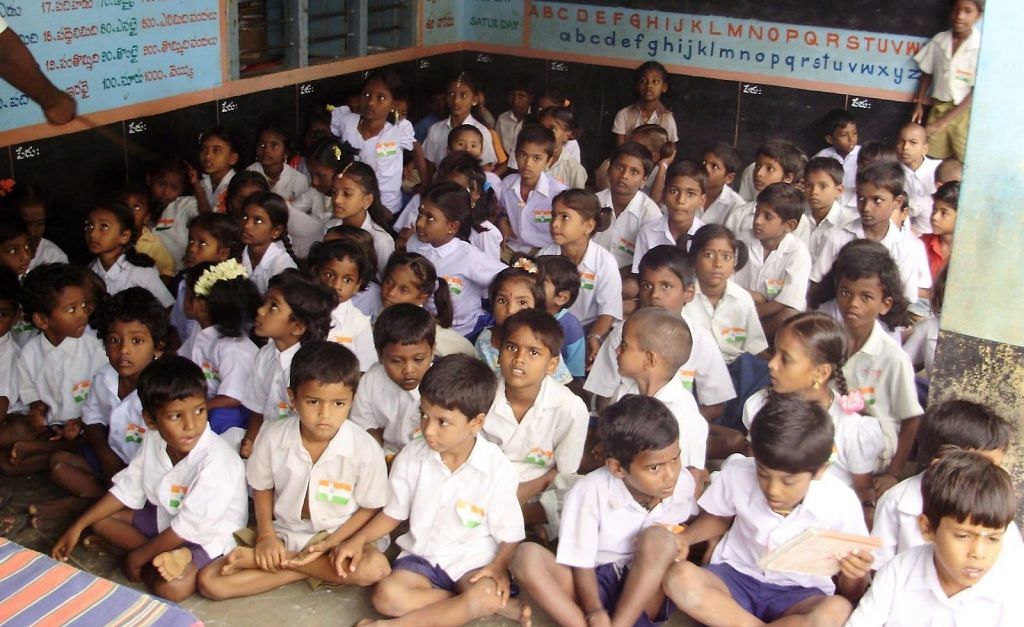Since students do not get to listen to English or speak it, they aren’t able to build skills in the language. That’s what the government wants to change.
Chandigarh: After thirty-five per cent of its class 10 students failed their English language examination, Haryana has decided to fix the problem by catching them young. Government primary school students are now being taught one English sentence a day, to help them ‘befriend’ the language.
The campaign is titled ‘I am not afraid of English’, and teachers in almost 200 primary schools in the state have been trained to ensure that students as young as class 1 are able to understand and speak at least 20 sentences in English every month.
A booklet prepared by the National Council of Educational Research & Training (NCERT), containing a thousand English sentences and phrases, will be used by these teachers.
“It has 200 sentences each for classes 1 to 5. A primary teacher and one block resource person has been trained to teach the students. By the time they reach class 6, they should know a thousand sentences in English,” said Dheera Khandelwal, Haryana’s principal secretary, school education.
Also Read: NCERT textbooks will now feature more information on Emergency.
Nub of the problem
A report on English language teaching in primary classes, prepared by the technical support group of the Sarva Shiksha Abhiyan and the NCERT in 2012, had pointed out that class 1 and 2 textbooks did not build familiarity with the language. It said there was less focus on listening and speaking skills, while the text in the books did not link life at school to life outside.
The report added that since students did not get an opportunity to listen to English or speak it, they were not able to carry out even brief conversations in English or narrate experiences.
Also Read: Farm visits, gardening, drama: How govt is hoping to overhaul school curriculum.
“That is exactly what we intend to change. The idea is to make them listen to and speak English. The sentences which will be taught are the ones used in everyday life. That will take out the fear of the language, apart from the students feeling confident that they can converse in English,” said Khandelwal.
Worrying trend
According to the ‘Trends over time’ report in the Annual Status of Education Report (ASER) released in January 2015, the percentage of class 5 children who could read English words had decreased from 72.9 in 2009 to 65.7 in 2012, but improved to almost 72 per cent in 2014. However, most of this was attributed to the teaching of English in primary classes in private schools.
In government schools, the percentage had dropped from 66.3 in 2009 to 45.1 in 2012, and marginally increased to 48.7 in 2014. The number of class 5 students who could read English sentences in government schools showed a similar trend.
Also Read: Govt may revert to just English for NEET, instead of regional languages.
ASER 2017 pointed out that in Haryana’s rural areas only 71 per cent of students in class 8 could read simple sentences in English, and another 15 per cent could only read simple words. In class V, only 55 percent could read simple sentences in English and only 25 per cent could read simple words.
In the March 2018 examination conducted by the Haryana’s Board of Secondary Education, 67 per cent students passed in English. The result was below 60 per cent in Palwal, Mewat and Yamuna Nagar. Charkhi Dadri and Jhajjar recorded the best pass percentage of over 80 per cent.
Other measures
Khandelwal said as part of the focus on English, 180 government primary schools have been shortlisted to be English-medium schools for classes 1 and 2. Another 250 schools will be added this year.
“Apart from the 180 primary schools, we have also introduced science and mathematics books in English from class 9 onwards in over 300 secondary and senior secondary schools,” said Khandelwal.
